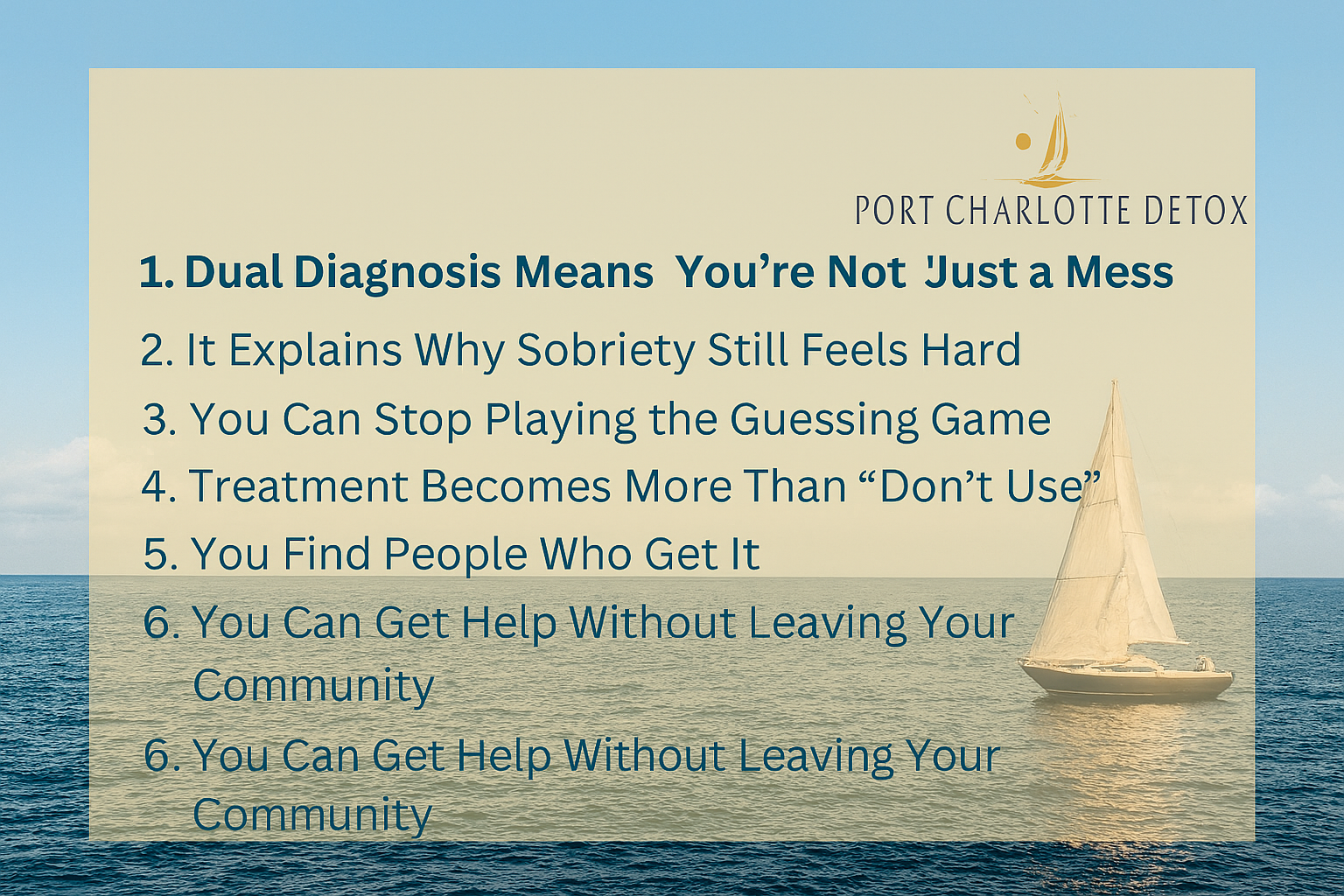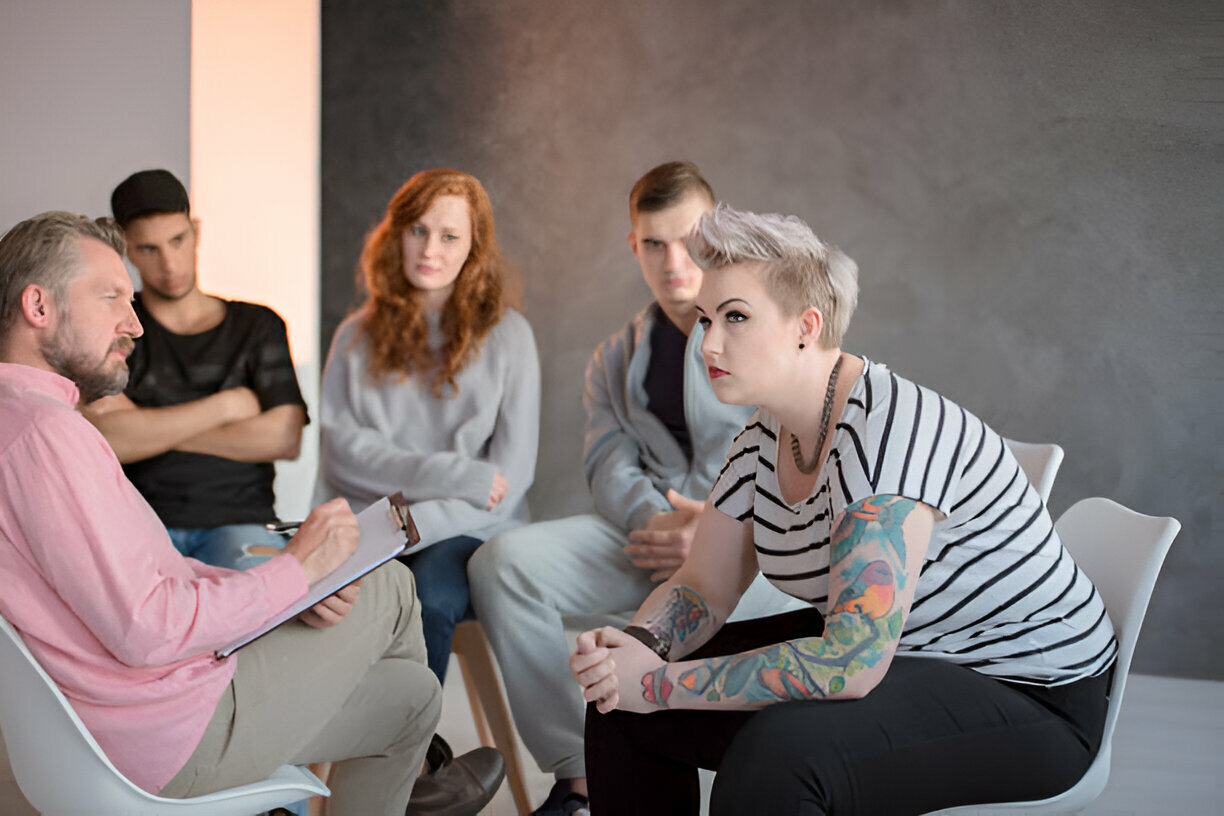When “Getting Sober” Doesn’t Fix Everything
In your first months without drinking or drugs, you expect to feel better. That’s the promise, right? Everyone says you’ll wake up clearer, laugh more, feel lighter.
But maybe that’s not your reality. Maybe you’re still anxious. Or your mood is all over the place. Or you can’t sleep. And instead of feeling proud, you start to think, What’s wrong with me? Did I do something wrong?
Then someone—maybe a counselor, maybe a friend—says two words you’ve never heard before: dual diagnosis. And suddenly, a lot of things start to make sense.
At Port Charlotte Detox, we see this moment often—when a person realizes it’s not that they’ve failed recovery. It’s that there’s another piece to the puzzle that no one addressed before.
1. Dual Diagnosis Means You’re Not “Just a Mess”
For years, you may have been told your struggles were because of your drinking or drug use. And yes, substances can make everything worse. But sometimes, there’s more going on beneath the surface.
Dual diagnosis treatment means looking at substance use and mental health at the same time. It’s for people who have both a substance use disorder and a mental health condition—like depression, anxiety, PTSD, or bipolar disorder.
When you hear this, it’s like switching on a light in a dark room. You can finally see that the problem isn’t you as a person—it’s a combination of conditions that can be treated.
2. It Explains Why Sobriety Still Feels Hard
Sobriety removes the alcohol or drugs, but it doesn’t automatically remove the depression, panic attacks, or racing thoughts you might have been using substances to cope with.
In fact, those symptoms can feel louder without the numbing effect of substances. That’s not failure—it’s your brain saying, Hey, there’s still something here we need to deal with.
Dual diagnosis treatment validates that. It gives you language for what’s happening and a plan that actually addresses both sides—so you’re not just left wondering why you’re still struggling.
3. You Can Stop Playing the Guessing Game
Before a diagnosis, every bad day feels like a mystery. You might wonder if you’re “just lazy” or “too sensitive” or “not cut out for recovery.”
With dual diagnosis treatment, you get an actual map. Instead of blaming yourself, you can understand what’s happening in your brain and body—and use specific strategies to manage it.
It’s the difference between trying to drive with a blindfold on and finally getting a clear view of the road.
4. Treatment Becomes More Than “Don’t Use”
If the only rule is don’t drink or use, life can feel like one long test you’re constantly about to fail. Dual diagnosis treatment adds more tools to the box.
You might work with a therapist who helps you unpack trauma. Or start medication that evens out mood swings. Or learn coping skills that actually work for your brain chemistry.
It’s not just about staying away from substances—it’s about building a life where you don’t need them to feel okay.

5. You Find People Who Get It
Being young and sober already puts you in a small group. Add mental health struggles, and it can feel like you’re in a group of one.
Dual diagnosis programs connect you with others who are dealing with both. You hear stories that sound like yours, and it shifts your perspective from I’m the weird one to I’m not the only one.
That connection can be a lifeline—especially when you feel like your friends don’t get it or your family doesn’t know what to say.
6. You Can Get Help Without Leaving Your Community
You don’t have to uproot your life to get quality care. If you’re looking for dual diagnosis treatment in Charlotte County or nearby, Port Charlotte Detox offers integrated care that addresses both substance use and mental health.
If you’re closer to the coast, there are also resources for dual diagnosis treatment in Fort Myers FL. Staying local can make it easier to keep your support network close while still getting the help you need.
FAQ: Understanding Dual Diagnosis
What exactly is a dual diagnosis?
A dual diagnosis means you have both a substance use disorder and a mental health condition at the same time. Treating both together is essential because each can make the other worse.
Do I have to take medication for a dual diagnosis?
Not always. Some people benefit from medication, others don’t need it. Treatment is individualized—you and your provider decide what makes sense for your symptoms and your goals.
Can I still recover without inpatient rehab?
Yes. While some people benefit from starting with inpatient care, others begin with outpatient therapy or community support programs. The important part is that both the substance use and mental health sides are addressed together.
How do I know if I might have a dual diagnosis?
Signs can include:
- Ongoing anxiety, depression, or mood swings even in sobriety
- Using substances to cope with emotions or thoughts
- Multiple past relapses without clear triggers
- Feeling like “sobriety doesn’t work” for you
If any of these feel familiar, it’s worth getting an evaluation.
Will I be labeled for life?
A diagnosis is not a life sentence—it’s a tool. It gives you and your treatment team a shared language so you can work toward stability and well-being.
Why Naming It Matters
When you’re young and sober, it’s easy to think you’re just “bad” at recovery if you’re still struggling. But getting a dual diagnosis can be a relief—it means there’s a reason for what you’re feeling, and that reason has solutions.
It’s not about putting you in a box. It’s about finally having a map so you can stop wandering in the dark.
Call (844)336-2690 or visit our website to learn more about our dual diagnosis treatment services in Port Charlotte, Florida.


